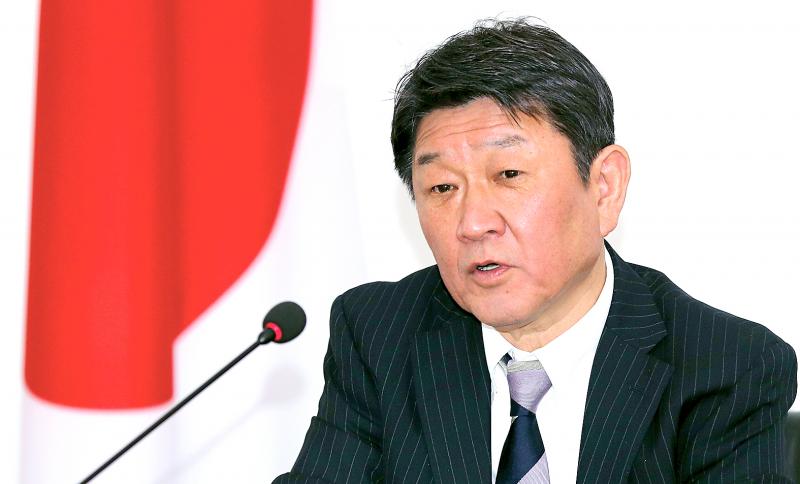The Ministry of Foreign Affairs yesterday thanked Japan for considering sending additional vaccines to Taiwan.
Japan on June 4 donated 1.24 million doses of the AstraZeneca COVID-19 vaccine to Taiwan as the nation is grappling with a shortage of jabs.
Japanese Minister of Foreign Affairs Toshimitsu Motegi yesterday announced that Tokyo is sending 1 million doses to Vietnam today, and is considering sending another batch to Taiwan through the COVAX vaccine sharing initiative, as well as shipping vaccines to other Southeast Asian nations.

Photo: EPA-EFE
The government would maintain close communications with Tokyo and hopes that the vaccines would arrive soon, ministry spokeswoman Joanne Ou (歐江安) said.
Minister of Health and Welfare Chen Shih-chung (陳時中), who heads the Central Epidemic Command Center, also thanked Tokyo for its goodwill.
In other developments, the ministry reiterated its support for Medigen Vaccine Biologics Corp (高端疫苗) to conduct phase 3 clinical trials for its COVID-19 vaccine candidate in Paraguay, after the developer announced its phase 2 trial results in Taiwan last week.
The company and the National University of Asuncion Faculty of Medical Sciences on April 22 met virtually to discuss clinical trials for COVID-19 vaccine development.
The ministry at the time said it welcomed the cooperation.
The two parties on May 12 signed a memorandum of understanding, with the faculty saying it “is interested in organizing and executing MVC’s [Medigen] COVID-19 vaccine clinical trials in Paraguay,” Chinese-language Mirror Media reported yesterday, publishing part of the document.
The ministry is glad to see medical cooperation between Medigen and the university, Ou said in a statement, adding that the ministry would continue to offer assistance.
Once the nation’s locally developed vaccines obtain emergency use authorization and after meeting the domestic demand for jabs, the government would be happy to share them with diplomatic allies to help them combat the pandemic, she added.
Paraguay is one of the nation’s 15 diplomatic allies and the only one in South America.
Following speculation that it might switch recognition to Beijing in exchange for COVID-19 vaccines, Paraguayan President Mario Abdo Benitez on April 20 said the country would not accept any kind of blackmail or diplomatic conditions in exchange for vaccines from Chinese suppliers, after the country procured vaccines from India.

AGING: As of last month, people aged 65 or older accounted for 20.06 percent of the total population and the number of couples who got married fell by 18,685 from 2024 Taiwan has surpassed South Korea as the country least willing to have children, with an annual crude birthrate of 4.62 per 1,000 people, Ministry of the Interior data showed yesterday. The nation was previously ranked the second-lowest country in terms of total fertility rate, or the average number of children a woman has in her lifetime. However, South Korea’s fertility rate began to recover from 2023, with total fertility rate rising from 0.72 and estimated to reach 0.82 to 0.85 by last year, and the crude birthrate projected at 6.7 per 1,000 people. Japan’s crude birthrate was projected to fall below six,

US President Donald Trump in an interview with the New York Times published on Thursday said that “it’s up to” Chinese President Xi Jinping (習近平) what China does on Taiwan, but that he would be “very unhappy” with a change in the “status quo.” “He [Xi] considers it to be a part of China, and that’s up to him what he’s going to be doing, but I’ve expressed to him that I would be very unhappy if he did that, and I don’t think he’ll do that. I hope he doesn’t do that,” Trump said. Trump made the comments in the context

SELF-DEFENSE: Tokyo has accelerated its spending goal and its defense minister said the nation needs to discuss whether it should develop nuclear-powered submarines China is ramping up objections to what it sees as Japan’s desire to acquire nuclear weapons, despite Tokyo’s longstanding renunciation of such arms, deepening another fissure in the two neighbors’ increasingly tense ties. In what appears to be a concerted effort, China’s foreign and defense ministries issued statements on Thursday condemning alleged remilitarism efforts by Tokyo. The remarks came as two of the country’s top think tanks jointly issued a 29-page report framing actions by “right-wing forces” in Japan as posing a “serious threat” to world peace. While that report did not define “right-wing forces,” the Chinese Ministry of Foreign Affairs was

PREPAREDNESS: Given the difficulty of importing ammunition during wartime, the Ministry of National Defense said it would prioritize ‘coproduction’ partnerships A newly formed unit of the Marine Corps tasked with land-based security operations has recently replaced its aging, domestically produced rifles with more advanced, US-made M4A1 rifles, a source said yesterday. The unnamed source familiar with the matter said the First Security Battalion of the Marine Corps’ Air Defense and Base Guard Group has replaced its older T65K2 rifles, which have been in service since the late 1980s, with the newly received M4A1s. The source did not say exactly when the upgrade took place or how many M4A1s were issued to the battalion. The confirmation came after Chinese-language media reported